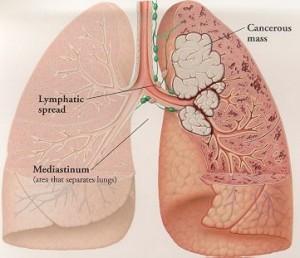Lung cancer is the second most common cancer affecting men (after prostate cancer) and women (after breast cancer). Even though it’s not the most common type of cancer, it’s by far the leading cause of cancer related death in this country. Lung cancer primarily affects older adults, although it can happen at any age. This is why lung cancer screening is so important helping to detect cancer at an earlier stage and save lives.
Lung cancer occurs when abnormal cells grow in the lung tissues and form a tumor. These tumors can be life threatening and may spread to other parts of the body. Lung cancer is a malignant lung disease primarily caused by cigarette smoking. It often has no obvious symptoms until the disease is quite advanced, and has a low rate of survival. Treatment for lung cancer mainly involves surgery and chemotherapy, while radiation therapy and targeted drug therapies may also be used.

Lung Cancer
What is Lung Cancer?
Lung cancer is prominent in older men and women (from 65 years of age), and is the second most common of cancers.Lung cancer is the abnormal growth of cells within the lung/s that affect and restrict the normal functioning of the lungs to provide oxygen to body tissues via the blood. People with other forms of cancer (elsewhere in their body) have the risk of developing lung cancer because of metastasis (cancer spread), called secondary lung cancer.
Symptoms of Lung Cancer
It’s important to report any unusual physical feelings to your doctor. Often, these unusual feelings can be attributed to other causes, such as bronchitis. But a doctor should check anything that is unusual or worrisome. The signs and symptoms of lung cancer can take years to develop and they may not appear until the disease is advanced.
- A new cough that doesn’t go away
- Changes in a chronic cough or “smoker’s cough”
- Coughing up blood, even a small amount
- Shortness of breath
- Chest pain
- Wheezing
- Hoarseness
- Losing weight without trying
- Bone pain
- Headache
Treatment of Lung Cancer
Treatment of Lung Cancer may involve Radiation Therapy, Chemotherapy, Surgical Removal of the tumor, or a combination of these forms of treatment. Location of the tumor, the tumor’s extent, and the overall health of the person are all taken into account when considering which form or forms of treatment are appropriate for them.
- Surgery
- Radiation
- Chemotherapy
- Brain Prophylactic Radiation
- Treatment of Lung Cancer Recurrence
- Targeted Therapy
- Photodynamic Therapy (PDT)
- Radiofrequency Ablation (RFA)
- Experimental Therapies
- Lung Cancer Prognosis
